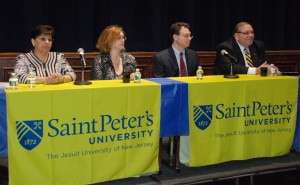Homelessness is a condition that does not discriminate. Regardless of race, religion or economic standing, there are a variety of situations that can lead to an individual – and even a family – into having no place to call home. In the United States, more than 3.5 million people experience homelessness each year. According to the National Alliance to End Homelessness, 633,782 people experience homelessness on any given night in the country. Of that number, 239,403 are people in families and 392,945 are individuals. About 10 percent of the homeless population – 62,619 — are veterans.
Due to this prevalent problem, the Guarini Lecture Series hosted Homelessness 101: A Solvable Crisis on Thursday, February 14, at Roy Irving Theatre. The event was held to educate students about homelessness and to discuss potential long-term solutions for the problem.
The symposium opened with a panel discussion on homelessness in Hudson County and featured Nidia Lopez, councilwoman for the City of Jersey City; Alison Recca Ryan of the Corporation for Supportive Housing; and Jeffrey Wild, a partner at the Lowenstein Sandler law firm. Dan Altilio, president of the United Way of Hudson County, served as moderator. Each panelist, as well as the moderator, presented a different perspective on the topic, from why homelessness is still a problem in the United States despite government funding to suggested solutions to end the crisis.
“We’re hoping today you will walk out inspired and charged to make a difference,” said Altilio. “This is not about politics; this is about our brothers and sisters on the street.”
While the leader of the United Way of Hudson County, a non-profit organization that works to resolve pressing community issues such as homelessness through fundraising and support, Altilio suggested that nonprofits were partly responsible for the issue of homelessness. He told the audience that many of these organizations were not allocating government funding correctly, and were using the money to subsidize short-term alternatives to homelessness instead of long-term solutions.
“What is more compassionate, to end homelessness or treat it?” he asked.
Wild proposed that false stereotypes surround many of those who are homeless, and that the crisis affects many hard working people who do not make enough money to live in today’s society.
He said, “There’s a lot of people who aren’t crazy and aren’t addicted, and they have a right to be indoors,” Wild said. “These are people just like you and me.”
Wild also suggested that the government is largely responsible for the crisis that exists today, saying the officials, legislators and other public executives are not providing the proper resources to help the homeless.
“If you make more than $7 a day, you are too rich to get emergency shelter or permanent housing,” Wild said.
Questions to the panelists ranged from addiction services for the homeless, the development of permanent housing, the money allocated by the government for homeless services and more.
After the panel discussion, Philip F. Mangano, president and CEO of the American Round Table to Abolish Homelessness, delivered the keynote address. A lunch training session on civic engagement with members of the University community was also held.
The symposium was sponsored by the Guarini Institute for Government and Leadership and the United Way of Hudson County. Co-sponsors included the School of Education, Department of Criminal Justice, Political Science, Sociology and Urban Studies, Theology, Office of Mission and Ministry, Office of Campus Ministry, Honors Program, Public Policy Program and Social Justice Program.

